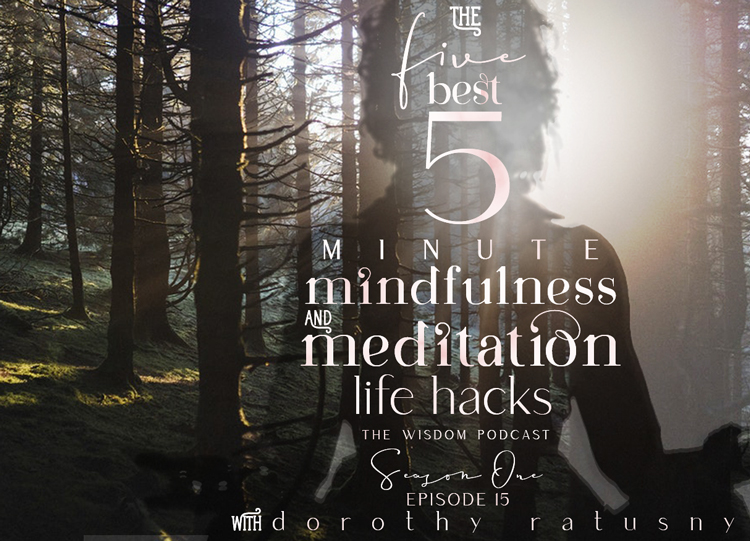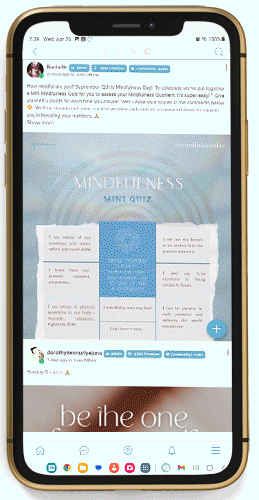
The Five Best ‘5-Minute’ Mindfulness and Meditation Life Hacks
The WISDOM podcast Season 1 Episode 15
with Dorothy Ratusny
Listen to Episode 15 of The WISDOM podcast!
TIMESTAMPS:
Podcast Intro: 0-2:10 | The Science of Meditation and Mindfulness: 2:11 | Meditation is… 4:52 | Meditation is… not: 5:22 | One Benefit of Meditation: 6:21 | The Satipatthana Sutta… 9:22 | The 1st Best Life Hack for Your 5-Minute Mindfulness and Meditation Practice: 11:56 | The Science and Rationale for Life Hack #1: 13:35 | My Client Laura’s 5-Minute ‘door closed’ Mindfulness Break: 14:32 | Your 5-Minute sessions of Mindfulness and Meditation will Bring You Calm: 15:31 | The 2nd Best Life Hack for Your 5-Minute Mindfulness and Meditation Practice: 17:13 | The Science and Rationale for Life Hack #2: 17:55 | The 3rd Best Life Hack for Your 5-Minute Mindfulness and Meditation Practice: 18:56 | The Science and Rationale for Life Hack #3: 20:44 | The 4th Best Life Hack for Your 5-Minute Mindfulness and Meditation Practice: 21:30 | The Science and Rationale for Life Hack #4: 23:25 | The 5th Best Life Hack for Your 5-Minute Mindfulness and Meditation Practice: 24:28 | The Science and Rationale for Life Hack #5: 25:02 | Meditation and Mindfulness Resources (my gift to you): 26:27 | Next Week’s Episode Sneak Preview! 27:58 | Podcast Outro: 29:35
![]()
The science of Meditation and Mindfulness reveal how effective a short 5-minute practice can be for controlling anxiety and reducing one’s perception of what is stressful, for feeling relief and comfort, for reclaiming presence, for focusing the mind and lengthening attention span, for positive emotional health and enhanced self-awareness; and for gaining a different or more accurate perspective. Stress reduction is one of the most common reasons why people practice meditation and mindfulness.
TRUTH SERUM: Mindfulness allows you to appreciate life for its singular moments and for the act of being in the present. Meditation is the act of focusing your attention – your awareness – onto a single object (or a process such as your breathing) in this moment as both an experience and a process of being mindful. These two practices are interchangeable; and they become a new way of experiencing life as you live it – in each moment.
A-HA MOMENTS: Every moment is precious. What is most important is what you choose because this is reflected in how you feel and what you do. The real purpose of mindfulness and meditation is to have a practice and a way of life – in which you experience the present moment – fully.
PRACTICAL WISDOM: Meditation may be formal or informal. Informal meditation is mindfulness. There are different practices of formal meditation based on different philosophies and customary rituals; the common element of which is sitting or lying in a comfortable posture while attending to one’s awareness; and to focus the mind typically onto a single point or object; returning the mind to this point each time that it may wander. Meditation becomes a practice of observing the present moment and training the mind to focus where you choose to place attention.
Especially if you are new to these practices or if you are wishing to develop a habit of mindfulness and meditation as a regular part of your life; these 5-minute life hacks will enrich your present moment experiences, offer insight, enhanced awareness – and build the habit of holding presence – in each moment that you choose this.
– dorothy ratusny
Every moment is precious. What is most important is what you choose because this is reflected in how you feel and what you do. The real purpose of mindfulness and meditation is to have a practice and a way of life – in which you experience the present moment – fully. Remember that each conscious breath that you attend to fully – is a mindful moment. Mindfulness allows for a greater appreciation of ‘what is’; of awareness and attention to life’s abundance and simple pleasures; to being discerning of aspects of yourself such as your breath, your mood state, and the thoughts that you hold; your posture and other self care practices that nourish the self.
Further, when you experience several mindful moments linked together; for example, your attention focused on an object of your choosing (a candle flame, a cloud formation in the sky, gently moving) or an experience of conscious breathing – these become a source of brief meditation – “The conscious deliberate act of holding attention onto a particular point of focus.” When you notice when your mind wanders from where you have placed your focus and as you are able to return your attention at will, this 5-minute mindfulness practice becomes an example of formal, artful meditation.
Meditation is not the absolute holding of attention without disruption but rather the practice of focused attention and awareness by choice. You choose a point of deliberate focus in which to hold attention onto, but you also recognize that your mind will move from this focus. This is the habit of the mind; to attend to new thoughts and to be distracted onto thinking of the past and future. Your awareness of this becomes your cue for resuming your focus; for placing your attention onto something new. The idea of meditation is that you direct your mind deliberately where you wish to hold attention and to simply observe what you notice in doing so.
One benefit of meditation is to develop the practice of focusing your mind; to improve your ability to hold attention where you have chosen and for as long as you choose. Meditation reminds you that you choose what you think about and how you direct your mind to think. This is also from where we explore the idea of being rather than doing.
Mindfulness allows you to appreciate life for its singular moments and for the act of being in the present. Meditation is the act of focusing your attention – your awareness – onto a single object (or a process such as your breathing) in this moment as both an experience and a process of being mindful. These two practices are interchangeable; and they become a new way of experiencing life as you live it – in each moment.
Two questions that you may wish to ask yourself to assist in your experience of both mindfulness and meditation: Am I being mindful? and What can I choose to meditate upon? When you ask these questions of yourself daily, it will make the difference between living far more of your life, aware and awake.
Just before we dive in to this list, I’d like to reiterate what mindfulness and meditation is. Mindfulness is: present moment awareness. It is bringing an attitude of curiosity and observation to what you notice. Mindfulness is what allows you to experience the present moment, and to live each moment fully in the experience of it; as it is – and not preoccupied or distracted by the thoughts in your mind. This allows you to enjoy life even more. The benefit to living more of your life with mindfulness and present moment awareness is a richer experience; presence in observing what ‘is’ – being an active participant in your life, and being privy and aware of more because you are fully attentive.
- In the Satipatthana Sutta which is one of the most celebrated and widely studied discourses in the Pāli Canon of Theravada Buddhism, acting as the foundation for contemporary vipassana meditational practice, the Buddha’s use of the word sati means ‘attention’ in exactly the way that a modern cognitive therapist would describe the word. Sati is the conscious perception and evaluation of something; such as discriminating right from wrong. In the Sutta, sati is linked to the word atapi which means ‘strong intention’; and which implies purpose and goal-directed behaviour. So when we think about modern day mindfulness, and if we want to consider its true roots and meaning; mindfulness is the ability to hold attention purposefully, to help us make right decisions and to be attentive and aware in our lives.
Meditation may be formal or informal. Informal meditation is mindfulness. There are different practices of formal meditation based on different philosophies and customary rituals; the common element of which is sitting or lying in a comfortable posture while attending to one’s awareness; and to focus the mind typically onto a single point or object; returning the mind to this point each time that it may wander. Meditation becomes a practice of observing the present moment and training the mind to focus where you choose to place attention.

Click to Tweet!! xo
As we go through this list, perhaps it will inspire for you the simplicity of these practices and for how each offers much in revealing how life can be a series of moments; many of which are sacred and special because of your awareness of them.
Let’s look at the list:
Here are the five best life hacks for having a 5-minute mindfulness and meditation practice.
1. The 1st Best Life Hack is to create space in your Day for 5 minutes of Mindfulness and Meditation and commit yourself to this.
When does it feel most helpful to take some deep conscious breaths or to close your eyes for 5 minutes and practice formal meditation? When would you most benefit from a mindful presence – of being deliberately attentive to what you notice and are aware of. When would be the best time for meditation – in which you sit or lie comfortably for 5 minutes or longer holding awareness and attention onto a point of focus; or being guided through a meditation practice?
At first you may wish to set reminders in your phone that guide and direct you to this. When your alarm indicates it is time for a 5-minute practice perhaps this will be something that you look forward to as a healthy reprieve and a means of bringing your focus into the present.
Here is the science and the strategy for this life hack: Making mindfulness and meditation a habit happens when you deliberately build it into your daily routine. It’s most helpful if you can schedule: (1) the optimal time(s) of day for these practices and (2) Your 5 minutes of mindfulness and meditation act as helpful impromptu strategies often when you need it most – to decompress, to feel calm and centred in your body in the present, or to relieve an unpleasant feeling or mood state; and to improve cognitive focus. Just remember that all you need is 5 minutes and without expectations. Rather, allow yourself to take in the full experience and whatever it offers you.
One of my clients – a busy family lawyer – closes her office door at the same time each day. At first, Laura hung a sign on her door to let her associates and support staff know that she was meditating. After a time, her colleagues came to expect that her door would be closed at 3 pm each day. Laura began to receive positive feedback, as others noticed that she was calmer and seemed happier after her daily meditation session each afternoon. Laura noticed that her focus was better when she resumed her work after brief sessions of mindfulness meditation (Current research also supports this). And it wasn’t long before her 5-minute practice became a 15-minute ritual that was her self-ascribed daily dose of calm and perspective that she has found most enjoyable.
Your 5-minute (and sometimes longer) sessions of mindfulness and meditation will bring you calm and relief. It will help re-frame you perspective – especially if you live a busy and often ‘stress-filled’ life. If you want to experience the greatest benefits of mindfulness and meditation, commit to a 5-minute regular practice that you carve out time for each day. Set a daily reminder in your phone so that you can pause whatever you are doing for this practice. Like Laura, who managed on most days to commit to her 3 pm alarm when it sounded – it became something she looked forward to and it did wonders for her mental and emotional well-being.
Scheduling a 5-minute practice at different times throughout your day offers you a simple reprieve; a chance to focus inward; and to take in your surroundings with greater awareness. There is nothing that you need to do further. Mindfulness and meditation are not tasks that you can accomplish, but rather they are ways of being; of having awareness and presence of living fully of this moment.
Your 5-minute meditation and mindfulness practice becomes a regular part of each day (and your life) when you make the commitment to yourself for this.
2. The 2nd Best 5-Minute Mindfulness and Meditation Life Hack is this: When you feel anxious, stop and breathe. See if you can pull yourself out of whatever you are doing for 5 minutes and be attentive to your breath, to soothing yourself with your breathing. This becomes a habit more easily as you remind yourself that a 5-minute mindfulness or informal meditation practice is a way to reset; to gain perspective; and to have a reprieve from what thoughts were the source of your stress.
The science and rationale behind this strategy is this: In your 5-minute practice of mindfulness or meditation, the idea is to be aware and attentive in this moment. The purpose of meditation and mindfulness is not to halt your thoughts or keep your mind strictly focused. Rather, it’s about holding presence to your experience. Holding attention unto your breath is quite likely the simplest way to bring your attention fully into the present moment; as you breathe holding your focus onto your breath and observe what sensations you witness as you experience yourself breathing. It will serve you well to have more than one 5-minute mindfulness break each day; and to stop for a moment and be mindful whenever you feel overwhelmed or any other challenging emotion.
https://dorothyzennuriyejuno.com/portfolio-items/your-first-meditation-with-me-wisdom-archives-017/
3. A 3rd Best life hack for developing a regular 5-minute Mindfulness and Meditation practice is to choose an activity that you do regularly; such as eating, exercise, walking, taking public transportation or as you commute to work, and practice mindfulness of this specific activity for 5 minutes each day for a week. In fact, if you wanted to ensure that your mindfulness practice becomes a life long habit, you can continue in the practice of mindfulness of a particular activity and to observe what is noticed for a minimum of 2 months (actually 66 days to be exact) because that is what the research has suggested that this is the amount of time that is needed to develop a longstanding habit. Practising mindfulness of the everyday experiences and activities of life will help you to apply this practice as a way of being.
You may choose a different activity each day to be mindful of, in order to contemplate what it means to have greater awareness. Notice how your mindfulness practice of this activity makes it richer, more intensely beautiful, and how you may feel as you are fully engaged in what you are doing, thinking, and experiencing. For example, if you bring awareness – mindfulness – to your workout at the gym, are you more deliberate and focused in what you are doing? Do you notice your muscles working and how this feels? Are you less distracted in those 5 minutes of mindfulness?
The science and rationale behind this strategy: Your present moment awareness of an activity allows you to notice and learn more; it means that you are more attentive to yourself and your surroundings which allows for heightened feedback about this experience. Notice how your mindfulness practice of an activity allows for a more enjoyable experience of it; and with purposeful results. You may find yourself choosing to be mindful in more ways throughout your day. Notice as you do so what happens.
4. A 4th Best life hack for a 5-minute Mindfulness and Meditation practice is to train yourself to live mindfully by asking questions that will raise your consciousness. Ask yourself the questions: “What do I need in this moment?” and “What would allow me to feel happiness now?” and then just pause, sitting in the space of silence as your answers come from within you, rising up to the surface to meet your question. Your answers lend to a mindfulness practice that directs your attention inward; to assess your needs and allow you to make informed choices in the moment so that you may best provide yourself with what you need. You may feel depleted in your inner resources if you are always giving to others; but also if you focus on productivity and achievement at the expense of replenishing your self. Practice asking questions to become mindful and to formally meditate upon, as a way of introducing calm and relaxation, self-care and greater well-being. Discover what simple and often nourishing solutions you can give yourself because of your mindful awareness and in being reflective upon what is needed. I’ll leave a link here to a pdf that you can download for a set of questions that you can post where you can remind yourself of how specific questions can stir your awareness and open you to being awake and aware and in the present moment.
The science and rationale behind this strategy: When you ask yourself: “What do I need in this moment?” or “What would allow me to feel happiness now?” These questions unto themselves become the focus for your formal 5-minute meditation. This will allow answers to surface that come from a deeper source within you and which reveal what is right and best for you in this moment. The asking of your highest self can become a practice that you engage in often – particularly when you wish to solve a problem, for changing how you feel, for feeling comfort and support, and nourishing your being.
5. Finally, a 5th Best way to Enjoy a 5-minute daily practice of Mindfulness and Meditation is to listen to a mindfulness led practice or guided formal meditation. Whether you are new to mindfulness and meditation or an experienced guru, listening to others guide you in your practice will be helpful to engage your attention; as you focus on their words and instructions and as it is a helpful way to learn new ideas for your practice.
The science and rationale behind this strategy: Allowing yourself to be guided through a 5-minute (or longer) meditation or mindfulness practice keeps things new and creative; it also gives you more experience; and you will always be learning more.
Many of the meditation apps offer free trial memberships, and unlocked free content. Purchasing a subscription is a great way to take advantage of all of the content that they offer. Having guidance in your practice helps you to feel encouraged in what you are learning and it is helpful to be exposed to different kinds of meditations and mindfulness practices which grow your confidence and ability. Some of the most popular meditation and mindfulness apps are: Insight Timer, Aura, Calm, and Headspace; and of course there is an unlimited library of meditation and mindfulness practices free on YouTube. You may also find free mindfulness and meditation content on my website by visiting the Wisdom Archives.
Your ‘gifted’ and most special…. Meditation and Mindfulness Resources:
Why Taking A Deep Breath Feels Good: The Self-Healing Benefits of Deep Breathing
In the Present Moment …is Your Most Beautiful Life
Sharing the wisdom and beauty of divine love with you…
Namaste!
Podcast Theme Music: ‘Aura’ from the Album, Illuvia by Eternell www.eternell.net/album/illuvia
Accompanying Music: Eternell, ‘Isla Nocturna’ ‘Shrine (30min)’ and ‘Exaltation’ from the Album – “Illuvia”
A generous ‘thank you’ to Audio Engineer, Pavel Kirpikau for your incredible help!














Leave A Comment
You must be logged in to post a comment.